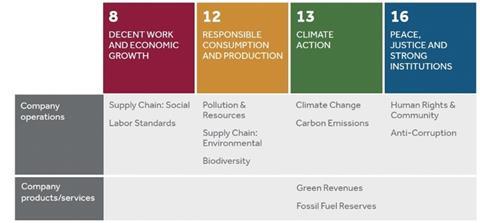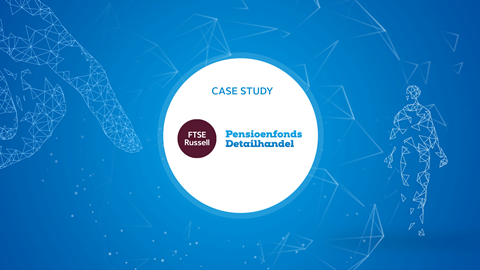- Signatory name: FTSE Russell
- Signatory type: Service provider
- Operating region: Global
- Assets under management: US$15 trillion*
- Assets in passive strategies: US$3.3 trillion**
- Signatory name: Pensioenfonds Detailhandel
- Signatory type: Asset owner
- Operating region: Pan-European
- Assets under management:€28 billion
- Assets in passive strategies: €28 billion
FTSE Russell has a long-standing commitment to sustainable investment and has been at the forefront of this trend since the launch of the FTSE4Good Index Series in 2001. We actively engage with regional sustainable investment associations and were a founding signatory of the PRI.
All of Pensioenfonds Detailhandel’s €28bn of assets under management (AUM) are invested passively. Our ESG policy incorporates themes such as labour rights that the trustees have identified as being aligned with four of the SDGs: 8, 12, 13 and 16.
Why align with the SDGs?
As Detailhandel chairman Henk van der Kolk puts it: Detailhandel wanted to minimise risk in its investments, while pursuing the highest possible returns in a sustainable manner. A member survey conducted for them by University of Maastricht found that about 70% of the fund’s members prefer to invest their pension savings more sustainably. As a result, the fund trustees – having already chosen three SDGs themselves (8, 13 and 16) – added a fourth, SDG 12, to the fund’s environmental, social and governance (ESG) policy and engaged FTSE Russell and BlackRock to develop ways to implement the policy within the investment strategy.
Figure 1: Focus on four UN Sustainable Development Goals

FTSE Russell proposed a framework for identifying areas of alignment between the SDGs (designed primarily for governments and policy makers) and FTSE Russell’s ESG data model (which is focused on corporate operations) and Green Revenues data model (which is focussed on corporate services and products). The three parties believed that by looking at common themes such as climate change, labour standards, biodiversity and governance, investors can use the SDG framework as a lens through which to assess company operations, products/services and business conduct, thus incorporating sustainable development considerations into the construction of a broad market portfolio.
How we aligned a passive equity portfolio with the SDGS
Detailhandel provided specific objectives and constraints:
- alignment with the four SDGs identified, as well as capturing additional specified exclusions;
- simple and transparent index design;
- benchmarked against a global, developed market equities index;
- within a tracking error of 100bps.
Mapping the SDGs to FTSE Russell’s sustainable investment framework showed that FTSE Russell’s ESG and Green Revenues data model broadly aligns with the SDGs, with some areas aligning particularly strongly e.g. SDG 8 (Decent Work and Economic Growth) aligns well with the Labour Standards and Social Supply Chain Themes from the data model.
Figure 2: Aligning SDGs with ESG data models

Constituent weights in the index were adjusted using over- and under-weight tilts, based on a combination of constituent-level ESG Theme scores, and company-level green revenue exposure (using the Green Revenues data). Climate-related aspects of the SDGs are further captured by incorporating companies’ exposure to fossil fuel reserves and their operational carbon emissions.
To maintain similar risk/return characteristics to the underlying benchmark, neutrality adjustments are applied to the ESG Themes (for regional industry neutrality) and operational carbon emissions (for sector neutrality).
The multi-factor tilting methodology used to construct the index provides investors the flexibility to adjust their exposure to each parameter. The methodology is transparent, allowing investors to understand how and why over/underweights were applied and providing support for investor stewardship objectives.
Detailhandel allocated its entire developed market passive equity assets, about €6bn, to a BlackRock-managed fund tracking the resulting SDG Aligned index.
References
*Data as of December 31, 2018 as reported on April 1, 2019 by eVestment for institutional assets, Morningstar for retail mutual funds, insurance products, and ETFs, and additional passive assets directly collected by FTSE Russell. AUM data includes blended benchmarks and excludes futures and options. AUM data will not include active and passive assets not reported to a 3rd party source or FTSE Russell. Passive assets directly collected by FTSE Russell have been removed from third party sources to prevent double counting. No assurances are given by FTSE Russell as to the accuracy of the data.
**FTSE Russell. Data as of June 30, 2019 as collected by FTSE Russell. No assurances are given by FTSE Russell as to the accuracy of the data. Total may not sum due to rounding.












